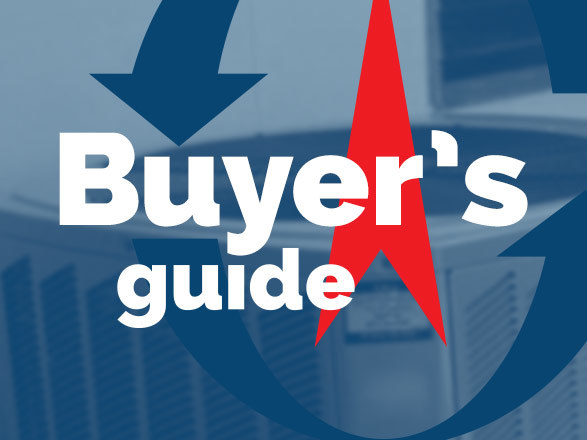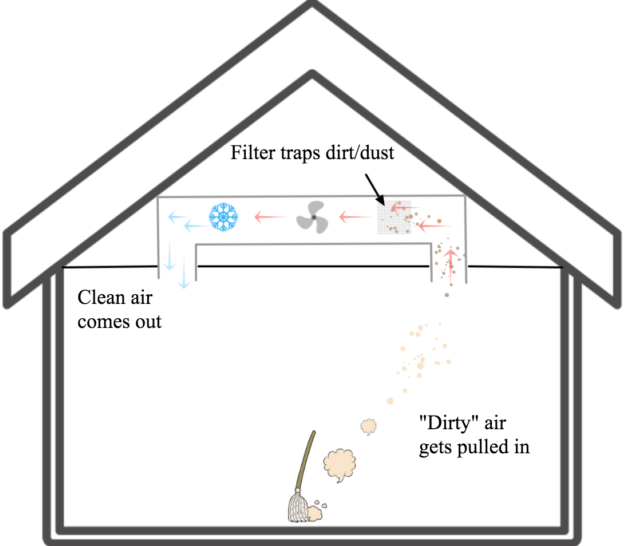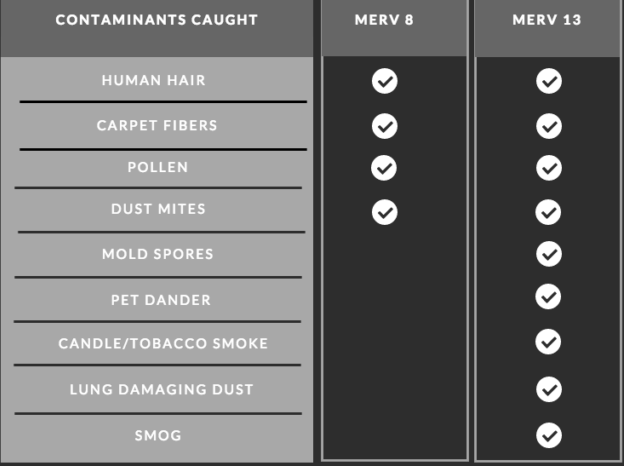What’s the Best HVAC Filter for My Home? A Florida Tech Answers
March 26, 2018

Wondering what’s the best HVAC filter for your home?
Our answer: It depends.
You see, the type of filter that’s “best” for your home depends on what you want your filter to do:
- Do you want the filter to simply protect your HVAC system and maybe clear out some excess dust while you’re at it? Then go with a MERV 5–8.
- Do you want the filter to protect your HVAC system and actually improve your home’s air quality? Then go with a MERV 9–16+.
We’ll go into each of these filter options in more detail. But first, let’s take a quick refresher on MERV and why you need a filter in the first place…
What’s MERV?
MERV stands for Minimum Efficiency Reporting Value, and it tells you what kind and size of pollutants a filter can trap.
The higher the MERV, the smaller the pollutants an air filter can catch. Most residential filters range from 1 to 16+ MERV.
Example:
- MERV 1–4 filters capture only larger particles like dust, dirt or hair.
- MERV 13 filters capture large particles but also much smaller ones such as bacteria from sneezes/coughs, cement dust, tobacco smoke, and more.
Why you need a filter in the first place...
You need an air filter to protect your HVAC system.
You see, your HVAC system is always sucking in dirty air from your home. And all the dust and debris from that dirty air can clog up your HVAC system which...
- Leads to breakdowns
- Reduces efficiency (raises your monthly energy bills)
But that’s where an air filter comes in. A filter catches most of those large dust particles before they reach your system so you don’t have any of those issues.

Your air filter blocks dust from entering your HVAC system and suffocating important components
Depending on its MERV, your HVAC air filter can also serve a secondary purpose: it can improve your home’s air quality.
A high-MERV filter (9–16) can trap pollutants like mold and pet dander so they don’t spread around your home’s air.
So, to recap:
- The higher the MERV, the smaller the pollutants an air filter can catch.
- The main purpose of an HVAC air filter is to block dust from entering your home.
- Your filter’s secondary purpose is to improve your home’s air quality.
Now let’s go into more detail about our recommendations for those 2 scenarios we mentioned in the beginning...
Only want to protect your HVAC system? Go with MERV 5–8
Filters with a MERV rating of 5–8 work well at keeping dust and other contaminants out of your HVAC system.
MERV 5–8 filters can catch contaminants like…
- Dust mites
- Pollen
- Carpet fibers
- Human hair
- Allergens
- Lint
- Large debris
Cost: MERV filters with a rating of 5–8 are fairly inexpensive—replacements range from $5 to $25+.
How often you should change them: MERV 5–8 should be changed every 90 days at the least (in heavy cooling season you should change it every 30 days).
Want to improve your home’s air quality too? Go with MERV 9–16
High-rated MERV filters (9–16+) not only keep dust out of your home’s HVAC system, they also keep pollutants out of your home’s air.
MERV 9–16 filters catch harmful pollutants like...
- Mold spores
- Pet dander
- Candle smoke
- Tobacco smoke
- Lung-damaging dust
- Humidifier dust
To help you compare the 2 categories of MERV ratings, we’ve made a comparison chart for you to see how a MERV 8 filter stacks up against a MERV 13:

MERV 8 vs MERV 13 filter
Cost: MERV 9–16 filters are more expensive, ranging from $25 to $55+.
Note: If you go with a high-MERV filter, you’ll need to make sure it’s a thick pleated filter (4–5 inches). If you get a high-MERV filter that’s too thin (less than 4 inches thick), it will fill up quickly with contaminants and restrict airflow into your system, which creates a pressure drop and lowers your HVAC system’s efficiency.
How often you should change them: Thick pleated high-MERV filters should be changed every 6 months.
Have more air filter questions?
Just give us a call and we’re happy to answer any air filter questions you may have.
Related articles
- Posted in:
- Air Quality

